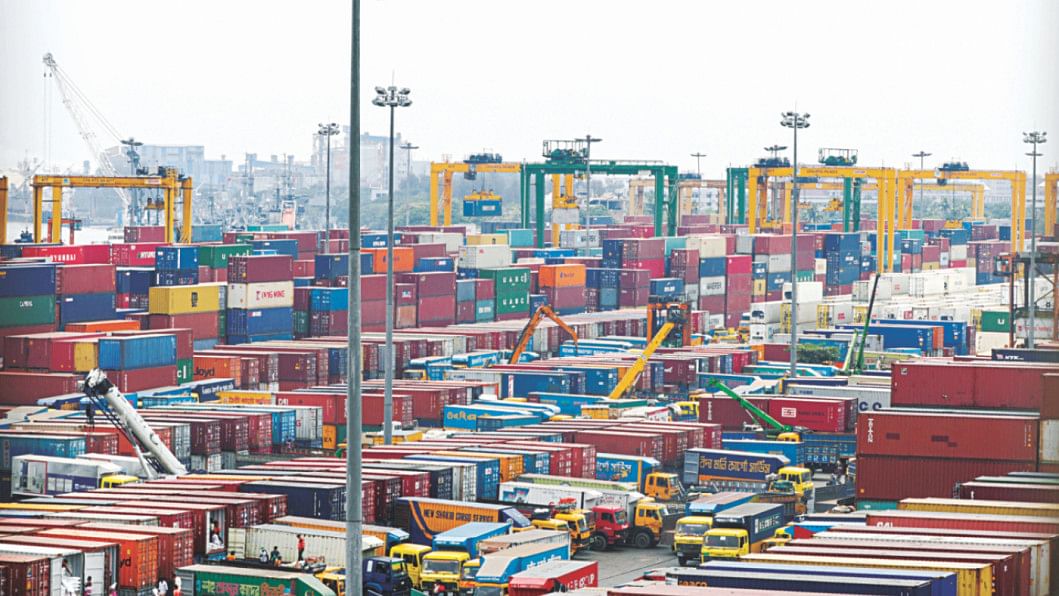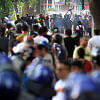Business takes a hit from acute port congestion

Operational activities at the Chattogram port moved at a snail's pace on the fourth day of an unprecedented disruption due to the government's imposition of a curfew and countrywide violence over the quota reform movement, hitting business and economy hard.
Import and export activities as well as cargo and container delivery were also seriously disrupted at the country's largest seaport due to a nationwide internet blackout since July 18.
As deliveries from the port dropped to rock bottom, an acute container congestion was created, hampering handling operations inside port yards.
A total of 7,367 TEUs (twenty-foot equivalent units) of import containers were unloaded from ships at the port over the past two days till Sunday morning. However, only 926 TEUs could be transferred outside.
Even then, berth operators said that most of the transferred containers were in fact transported to private inland container depots (ICDs).
Deliveries to consignees were nominal, with the port authority confirming that not a single import container could be delivered to consignees in the last 24 hours till 8:00am on July 21.
As a result, port yards were choked with 40,898 TEUs containers as of 8:00am on July 21, exceeding 76 percent of the total capacity of 53,518T EUs, according to data from the traffic department of the Chittagong Port Authority (CPA).
Nazmul Haque, executive director of Saif Powertec, which operates two terminals of the port, said the scarcity of space at the port yards had severely hindered operations.
"About 40 percent of the space needs to be free to ensure smooth operations. The internet blackout has made our jobs tougher because we don't have the scope to see the yard on the monitors now. So, staff of berth operators are trying to physically detect free spaces and accommodate containers," he said.
If the situation does not improve over the next couple of days, it will be difficult to maintain operational activities, he added.
Mohammad Saidul Islam, deputy commissioner of Custom House, Chattogram added that assessment of almost all import and export consignments was halted since the internet blackout prevented them from calculating duties, collecting revenue, and logging data entries of examinations.
"We are permitting the release of some imported perishable goods, essential commodities and fuel oil upon receiving an undertaking from importers.
"Similarly, a portion of export consignments that had previously completed the assessment process are being allowed to be shipped," he added.
Port officials said four vessels were scheduled to leave the port jetties on July 21. However, as containers could not be sent to the port on time, two vessels had to extend their stay while the remaining two departed with sparse cargo on board.
Singapore-bound vessel MV Sinarsaba was supposed to receive 380 TEUs of export containers but had to extend its stay after failing to receive even a single container from ICDs.
Similarly, Colombo-bound HR Shahare was booked to ship 250 TEUs of export containers but had to extend its stay by a day as no containers reached the port till the early hours of on July 21.
Kamrul Islam Mazumder, chief operating officer of Ispahani Summit Alliance Terminal at Kattoli, said they planned to send 132 TEUs of export containers to these two vessels by Saturday night but failed to do so because of a disruption in transportation.
Likewise, KDS Logistics failed to send 90 TEUs to the ships as drivers of container-carrying vehicles were unwilling to operate, said a senior official of the ICD.
Additionally, two vessels namely Maersk Port Klang and Anderson Dragon, sailed from the port on July 21 with only a fraction of the containers they were booked to carry.
Maersk Port Klang sailed with only 120 TEUs of empty containers against a booking of 1,000 TEUs of empty containers while Anderson Dragon left with 178 TEUs against a booking of 230 TEUs.
The transport of export containers from the 21 ICDs to the port also dropped significantly as very few trucks and covered vans loaded with export cargo arrived at the ICDs over the past four days, said Ruhul Amin Sikder, secretary general of Bangladesh Inland Container Depots Association.
Export activities at ICDs dropped by 80 to 85 percent due to the unavailability of export cargo from factories, he added.
Syed Tanvir Ahmed, managing director of leading denim exporter Pacific Jeans, said losses would be disastrous, adding that it may take two months to recover.
Mentioning that the country's export figure has declined in the last two years, he said such a blow to exports at the very beginning of the fiscal year would definitely have a negative impact on annual export figures.
"We hope the government can bring stability as soon as possible. If possible, normalcy should come back within tomorrow since Monday is very crucial for us as it is the first working day following the weekend in countries where our buyers are from.
"If we cannot resume production or communicate with the buyers by Monday, it will be a very wrong message to them."
Khairul Alam Suzan, vice-president of the Bangladesh Freight Forwarders Association, told The Daily Star that this crisis had damaged the country in two ways.
Firstly, it presented Bangladesh in a bad light in the global arena and secondly the economy was dealt a big blow as almost all activities have been paused due to the internet blackout.


 For all latest news, follow The Daily Star's Google News channel.
For all latest news, follow The Daily Star's Google News channel. 








Comments